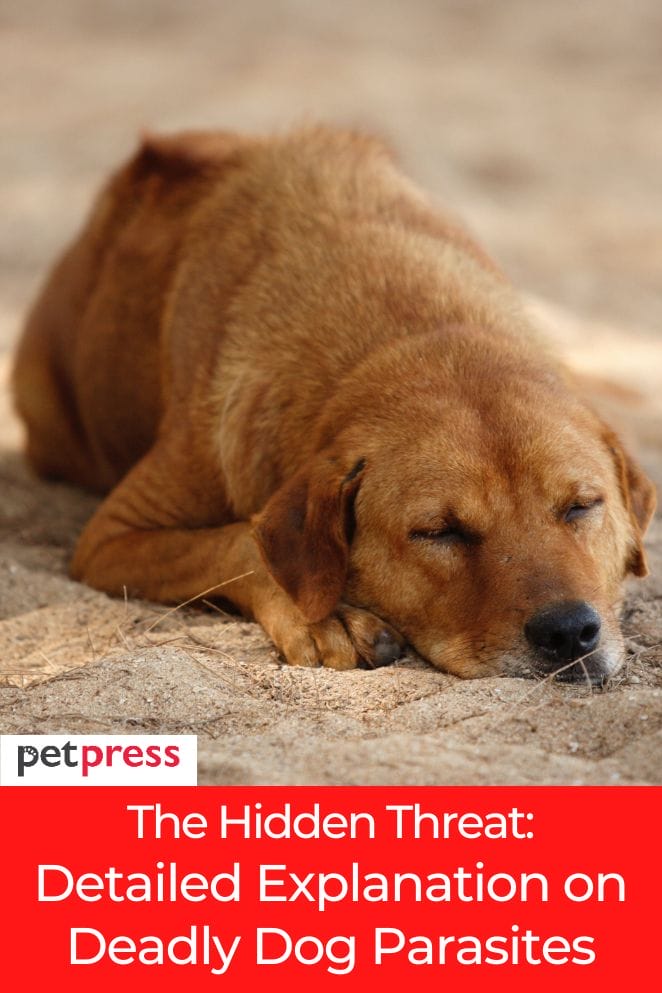
Dogs are more than just pets; they’re family.
We go to great lengths to keep them healthy, from regular vet visits to ensuring they get the right nutrition.
However, one of the most insidious threats to our furry friends is something we often can’t see until it’s too late: parasites.
These tiny invaders can cause significant health problems for dogs, sometimes leading to life-threatening conditions.
Understanding the types of parasites, their causes, and the signs of infection can help pet owners take proactive steps to protect their beloved companions.
Types of Parasites
Parasites that affect dogs can be broadly classified into two categories: external and internal parasites.
External Parasites
Ticks
Ticks are small creatures that bite dogs to feed on their blood.
They can spread serious diseases like Lyme disease, Rocky Mountain spotted fever, and ehrlichiosis.
These diseases can make dogs very sick if not treated.
In severe cases, ticks can cause dogs to become anemic (low in red blood cells) because they take too much blood.
Fleas
Fleas are tiny insects that cause dogs to itch a lot and can also lead to skin infections.
They can pass diseases like tapeworms when dogs accidentally swallow them.
Fleas are a big problem because they multiply fast.
One flea can lay hundreds of eggs, quickly spreading throughout your home and onto your pet.
Mites
Mites are very small bugs that cause mange, which makes dogs lose hair, itch a lot, and get infections on their skin.
Sarcoptic mange (scabies) is super contagious among dogs and can even spread to humans.
Humans can get itchy skin and rashes from dogs with scabies.

Internal parasites
Heartworms
Heartworms are worms that spread through mosquito bites.
When a mosquito carrying heartworm larvae bites a dog, the larvae enter the dog’s bloodstream and grow into long worms in the heart and lungs.
These worms can reach up to a foot long and cause serious problems.
They can lead to heart failure and breathing issues in dogs.
Without treatment, heartworm infection can be deadly.
Roundworms
Roundworms are common parasites that live in a dog’s intestines.
They can cause dogs to vomit, have diarrhea, lose weight, and look potbellied, especially in puppies.
Roundworms can also infect humans, which can be a big health concern, especially for children who might accidentally swallow roundworm eggs from dirt or things contaminated with dog feces.
Hookworms
Hookworms are small parasites that attach to the lining of a dog’s intestines and suck blood.
This can cause anemia, where the dog doesn’t have enough red blood cells, leading to weakness and, in severe cases, death.
Puppies are especially at risk because they are small and can lose a lot of blood quickly from hookworms.
Tapeworms
Tapeworms are worms that dogs can get from swallowing fleas or eating prey like rodents that have tapeworm larvae.
These worms attach themselves to a dog’s intestines and absorb nutrients from their food.
This can make the dog lose weight and become malnourished over time.

Causes of Infection
Parasites can infect dogs in various ways, depending on the type of parasite.
Environmental exposure
Dogs can pick up parasites like ticks, fleas, and mites from their surroundings, especially in grassy or wooded areas where these parasites live.
When dogs roam in these places, parasites can attach to their fur and skin.
It’s important to check your dog regularly after outdoor activities to catch and remove parasites early.
Ingestion
Internal parasites such as roundworms and tapeworms often enter a dog’s body when they swallow contaminated things.
This could be soil, water, or feces that contain parasite eggs or larvae.
Dogs can also get these parasites by eating prey animals that are infected.
Mosquito bites
Heartworms spread to dogs through mosquito bites.
When a mosquito carrying heartworm larvae bites a dog, the larvae enter the dog’s bloodstream and grow into adult worms in the heart and lungs.
Dogs in areas with lots of mosquitoes are at higher risk and should take preventive medication recommended by their vet.
Contact with infected animals
Dogs can get parasites by being around other infected animals.
This can happen through direct contact or by sharing places where infected animals have been, like parks or kennels.
Being close to infected animals raises the chance of getting parasites.

Signs and Symptoms
Recognizing the signs and symptoms of parasitic infections is crucial for early intervention and treatment.
Here are some common indicators:
Itching and scratching
Persistent scratching, biting, or licking by your dog can indicate the presence of parasites like fleas, ticks, or mites.
These parasites irritate the skin, leading to redness, scabs, or hair loss in the affected areas.
Checking your dog regularly can help you spot these signs early.
Digestive issues
Digestive problems such as vomiting, diarrhea, or a swollen abdomen may suggest your dog has internal parasites like roundworms or tapeworms.
Blood in the stool is a concerning sign that could indicate hookworms, which feed on blood from the intestines.
Lethargy and weakness
Parasites like hookworms or ticks can cause anemia in dogs, leading to fatigue and weakness.
If your dog seems unusually tired or lacks energy, it could be a sign of a parasitic infection affecting their blood and overall health.
Coughing and difficulty breathing
These symptoms can be linked to heartworm infection, where parasites grow inside the heart and lungs.
A persistent cough in your dog should never be ignored, as it may indicate a serious heartworm infestation that needs immediate veterinary attention.
Weight loss
If your dog is losing weight despite having a normal or increased appetite, it could be due to tapeworms or other internal parasites.
These parasites absorb nutrients from your dog’s food, leaving them malnourished despite eating well.
Visible parasites
Sometimes, you might actually see the parasites on your dog.
Fleas and ticks can be visible on their skin, especially around the ears, neck, and tail.
Additionally, segments of tapeworms may be seen in your dog’s feces or around their anal area, resembling small grains of rice.

How to Protect Your Dog from Parasites
Regular deworming
It’s important to give your dog deworming medication regularly as advised by your vet.
Deworming treatments help to get rid of internal parasites like roundworms, hookworms, and tapeworms.
These parasites can cause health problems if left untreated, so following your vet’s deworming schedule is crucial.
Monitor your dog’s activity
When your dog is outdoors, keep an eye on them to prevent them from picking up parasites like fleas, ticks, and mites.
Avoid letting them roam in areas with standing water or dense vegetation where parasites thrive.
Checking your dog for ticks and other pests after walks or hikes can also help catch any parasites early.
Maintain a clean environment
Keep your dog’s living space clean by regularly washing their bedding and cleaning up any feces promptly.
This helps reduce the risk of parasites like roundworm eggs and hookworm larvae from contaminating the environment and re-infecting your dog.
Annual checkups
Take your dog to the vet for annual checkups, even if they seem healthy.
Vets can perform tests to detect parasites early before they cause noticeable symptoms.
During these visits, discuss parasite prevention strategies with your vet, including flea and tick prevention products and other preventive medications.

Conclusion
Parasites pose a serious threat to dogs, but with vigilance and proper care, you can keep your furry friend safe.
Regular vet check-ups, preventative medications, and maintaining a clean environment are key strategies in the fight against these harmful invaders.
If you notice any signs or symptoms of parasitic infection, seek veterinary care immediately to ensure your dog receives the necessary treatment.
By staying informed and proactive, you can help your dog live a healthy, parasite-free life.
FAQs
It’s a good practice to check your dog. Regular vet visits, at least twice a year, can help catch internal parasites early.
Yes, some parasites, like roundworms and hookworms, can be transmitted to humans. It’s essential to practice good hygiene.
The best prevention for heartworm is a monthly preventative medication prescribed by your vet. Regular testing and keeping your dog indoors during peak mosquito hours can also help reduce the risk.
While some natural remedies may offer limited benefits, they are generally not as effective as vet-prescribed treatments and preventatives. Always consult your vet before trying any home remedies.
- Does Cat Litter Melt Ice? The Complete Guide to Winter Safety - January 30, 2026
- Happy Tail Dogs: Understanding This Common Canine Condition - January 29, 2026
- How Cold Can Outdoor Cats Handle? Feline Winter Safety - January 27, 2026


GIPHY App Key not set. Please check settings